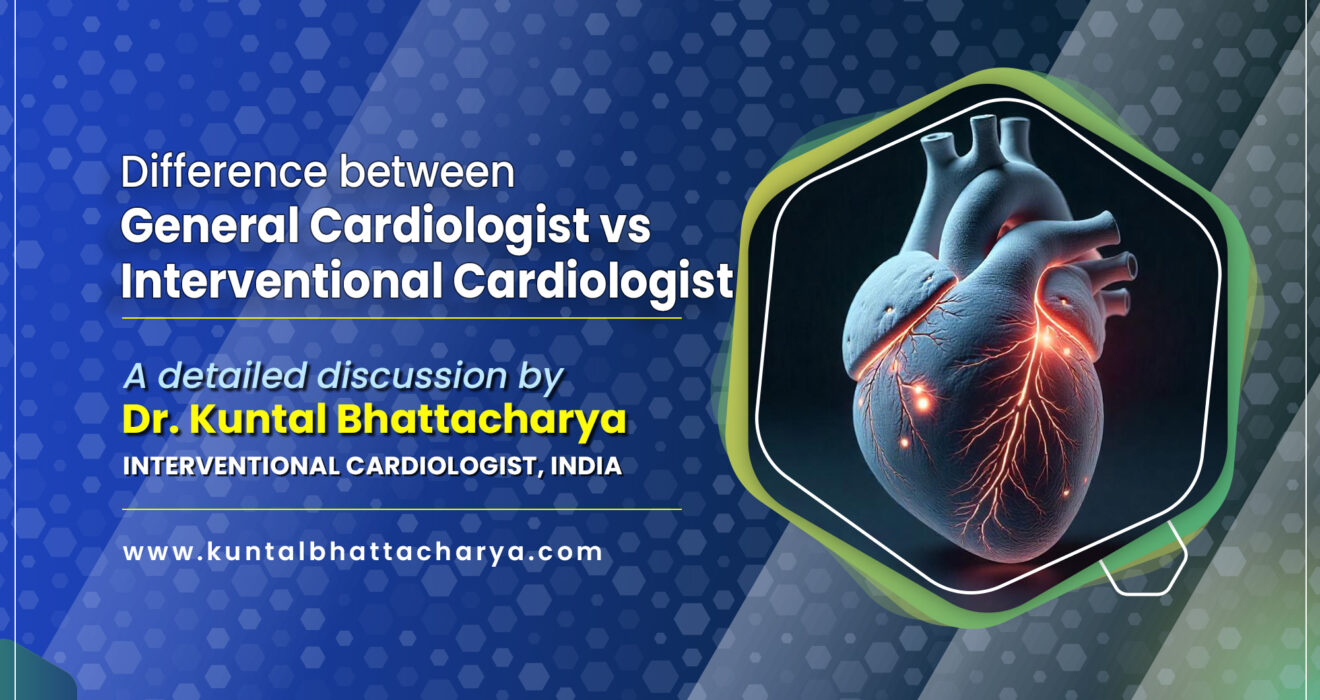Difference between General Cardiologist vs. Interventional Cardiologist
Difference between General Cardiologist vs. Interventional Cardiologist – A detailed discussion by Dr. Kuntal Bhattacharya, Senior Consultant Cardiologist in Kolkata
When it comes to heart care, many people often get confused between a general cardiologist and an interventional cardiologist. Both are heart specialists, but their roles are slightly different.
Introduction
A general cardiologist mainly focuses on diagnosing and managing heart conditions through medications, lifestyle advice, and regular monitoring. On the other hand, an interventional cardiologist is specially trained to perform procedures like angioplasty and stent placement to treat blocked arteries or other heart problems without surgery.
If you’re looking for expert heart care in the city of Kolkata, you’ll find both types of specialists easily available. Whether you need a routine check-up or an advanced heart procedure, you can consult a Cardiologist in Kolkata for your initial diagnosis and then visit an Interventional Cardiologist in Kolkata if your treatment needs go further.
In this blog, we’ll explain the key differences between the two so you can understand whom to consult and when—keeping your heart health in the best hands.
Who is a General Cardiologist?
A general cardiologist is a medical doctor who specializes in diagnosing, treating, and managing diseases and conditions of the heart and blood vessels (cardiovascular system). They don’t perform any surgeries. If patients notice any symptoms such as chest pain, shortness of breath, or irregular heartbeat, they are to first see a cardiologist.
Role and Responsibilities
- Diagnose heart-related issues
- Suggest lifestyle changes
- Prescribe medication
- Monitor chronic heart conditions
When Should You See a General Cardiologist?
- Persistent chest pain or pressure
- Shortness of breath with minimal activity
- Irregular heartbeat or palpitations
- Family history of heart disease
- High blood pressure or high cholesterol
- As part of a routine health check-up after age 40
Common Conditions Treated
- High blood pressure
- High cholesterol
- Chest pain
- Irregular heartbeat (Arrhythmia)
- Heart failure
A general cardiologist is a doctor in maintaining your healthy heart. Early diagnosis and ongoing management by a cardiologist can prevent major heart problems and improve quality of life.
Who is an Interventional Cardiologist?
An Interventional Cardiologist is a specially trained heart doctor who performs minimally invasive procedures to diagnose and treat diseases of the heart and blood vessels. Unlike general cardiologists who focus on diagnosis and medical treatment, interventional cardiologists use catheter-based techniques to open blocked arteries, repair heart valves, or treat other structural heart problems—without performing open-heart surgery.
They are often called upon in emergency situations, such as heart attacks, to restore blood flow and save lives.
What Sets Them Apart?
They perform minimally invasive procedures using catheters, balloons, and stents – no large incisions, no open-heart surgery.
Conditions Treated by Interventional Cardiologists
- Coronary artery disease (blocked arteries)
- Valve disorders
- Congenital heart defects
- Peripheral artery disease
When Should You See an Interventional Cardiologist?
- You’ve been diagnosed with blocked arteries
- You’re having symptoms like chest pain, breathlessness, or fainting
- You’ve been referred by a general cardiologist after abnormal test results
- You’re planning for or recovering from an angioplasty or similar procedure
Common Procedures Performed
- Angioplasty and stenting
- Balloon valvuloplasty
- Catheter-based valve repair
- Removing blood clots
Difference between General Cardiologist and Interventional Cardiologist at a Glance
Here is a short and simple explanation of the difference between a general cardiologist and an interventional cardiologist:
A general cardiologist is a heart specialist who focuses on diagnosing, treating, and preventing heart diseases using medications, lifestyle changes, and non-invasive tests. They manage conditions like high blood pressure, heart failure, and arrhythmias.
An interventional cardiologist, on the other hand, is a specially trained cardiologist who performs minimally invasive procedures like angioplasty, stent placement, and valve repairs to treat blocked arteries and other structural heart problems. They use catheters and advanced imaging tools to treat the heart without open surgery.
In short, general cardiologists manage heart conditions, while interventional cardiologists treat them through procedures when medicines alone aren’t enough.
Let’s compare :
Qualification and Training
- General Cardiologist: MBBS, MD, DM in Cardiology
- Interventional Cardiologist: Same qualification and they have an additional hands-on training in catheter-based procedures.
Scope of Practice
- General cardiologist: Diagnosis and medical treatment
- Interventional cardiologist: Diagnosis + Non-surgical procedures
Treatment Approach
- General cardiologist: Medicines, monitoring, lifestyle changes
- Interventionalcardiologist: Stents, balloons, catheters – physical repair of the heart
Tools and Techniques Used
- Generalcardiologist: ECG, echo, TMT, Holter
- Interventionalcardiologist: Angiogram machines, catheters, guidewires, stents
Collaborative Treatment Plansin Patient Care
General cardiologists and interventional cardiologists often collaborate closely to provide the best care for patients with heart problems. Each specialist has a unique role, and together, they ensure comprehensive treatment from diagnosis to after-procedure care.
Referral System
Your journey may start with a general cardiologist. If they find something serious like a blockage, they’ll refer you to an interventional expert.
Choosing the Right Specialist for Your Heart
Your heart deserves expert care. You need to choose the right specialist to keep your hearts I safe hands. If you need help managing high blood pressure, cholesterol, or general heart health, a general cardiologist is your go-to expert. But if you’re dealing with blocked arteries, valve problems, or need angioplasty or stenting, an interventional cardiologist is the right choice.
In a city like Kolkata, you can find both general and interventional heart specialists. It’s important to choose a Cardiologist in Kolkata or a Heart Specialist Doctor in Kolkata who has good qualifications, experience, and positive feedback from patients. For more advanced heart care, especially procedures like angioplasty or stent placement, it’s best to consult an Interventional Cardiologist in Kolkata who specializes in minimally invasive heart treatments.
Remember, the right heart doctor doesn’t just treat symptoms—they help you live a healthier, longer life.
The Top Hospital Facilities in Kolkata for General and Interventional Cardiology
Kolkata is home to several reputed hospitals that offer advanced cardiac care, where patients can consult both general cardiologists and interventional cardiologists. These hospitals are equipped with state-of-the-art diagnostic tools and catheterization labs (cath labs) for comprehensive heart treatment.
- Narayana- R.N.Tagore Hospital, Mukundapur: One of the top heart hospitals in Eastern India, RTIICS offers round-the-clock services by experienced cardiologists and interventional specialists. The hospital is known for handling complex cardiac cases and emergency angioplasties.
- Manipal Hospitals: Manipal has a strong cardiology department with both outpatient and emergency heart care. The hospital is well-equipped for advanced procedures like angiograms, angioplasty, and heart rhythm corrections.
- Fortis Hospital: Fortis has a highly skilled cardiology team and advanced cardiac catheterization labs. Patients here can consult for both preventive care and interventional procedures like angioplasty, stenting, and pacemaker implantation.
- Apollo Multispeciality Hospitals: Apollo offers integrated cardiac services with a team of renowned general and interventional cardiologists. They provide personalized treatment plans, advanced diagnostics, and emergency cardiac care.
- BM Birla Heart Research Centre, Alipore: India’s first standalone heart hospital, BM Birla is dedicated entirely to cardiac care. It is one of the best places in Kolkata for expert consultations, diagnostics, and complex interventional procedures.
- RxVital Healthcare: Established in 2021 in Kolkata, is a multidisciplinary smart clinic founded by experienced specialists. It offers integrated services including OPD consultations, diagnostics, pharmacy, and vaccinations. Equipped with advanced digital systems and AI-enabled imaging, RxVital ensures seamless, affordable, and patient-centric care.
These top hospitals in Kolkata ensure that whether you need a routine heart check-up or an urgent interventional procedure, you’re in safe hands with some of the best heart specialists in the city.
Conclusion
Understanding the difference between a general cardiologist and an interventional cardiologist can help you make the right choice for your heart care. Both types of heart specialist doctors play an important role in keeping your heart healthy. If you are unsure which doctor to see, start with a general cardiologist. They can assess your condition and refer you to an interventional cardiologist if needed.A general cardiologist helps in diagnosing heart problems, managing long-term heart conditions, and guiding you with medicines and lifestyle changes. On the other hand, an interventional cardiologist treats heart issues with special procedures to perform angioplasty and stent placement procedure to ensure quick recovery.In cities like Kolkata, many top hospitals have both types of specialists available, so patients can get complete and advanced heart care under one roof. Taking care of your heart is important. Early diagnosis and the right specialist can make a big difference in your recovery and overall health.
FAQs
Q1: What is the main difference between a cardiologist and an interventional cardiologist?
A cardiologist treats heart problems with medicine and monitoring. An interventional cardiologist uses tools to physically fix heart problems without open surgery.
Q2: Can a general cardiologist perform heart surgery?
No, general cardiologists do not perform surgeries or invasive procedures.
Q3: How often should I visit a heart specialist?
When youexperienceany heart-related symptoms like chest pain or breathlessness, then you need to visit heart specialist doctor.
Q4: Is interventional cardiology safe?
Yes, it’s generally very safe and far less invasive than traditional surgery. Recovery is quicker too.
Q5: Do I need a referral to see an interventional cardiologist?
Yes (In most cases). Your general cardiologist will refer you if needed.
Read Also:





2 Comments
Comments are closed.